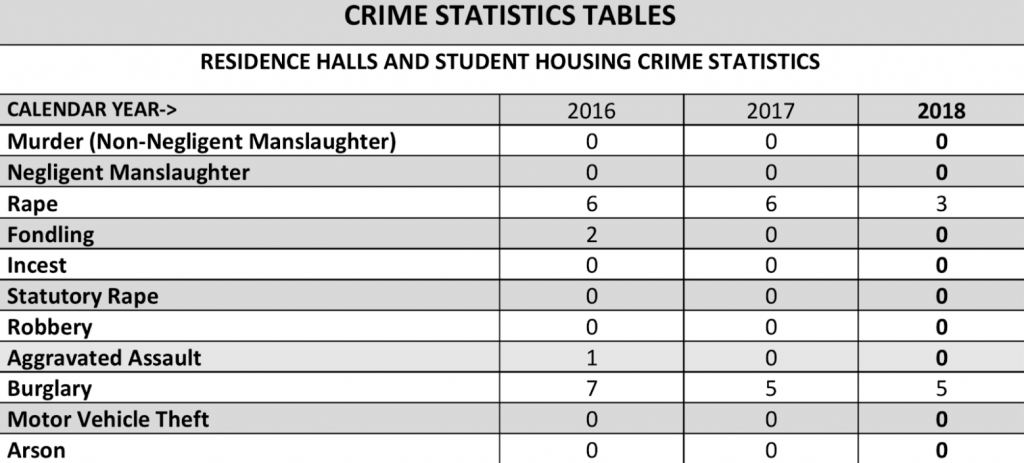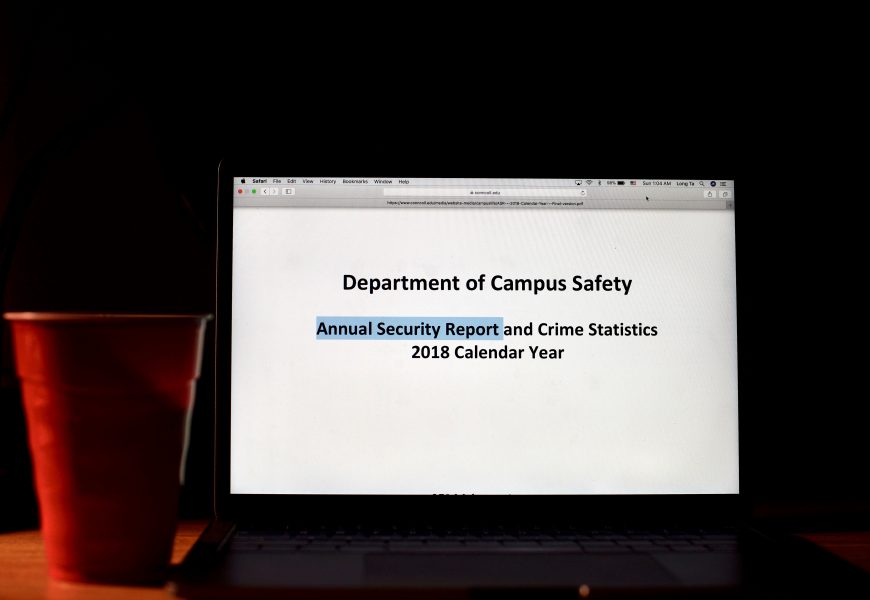Photo courtesy of Long Ta.
This fall, The Department of Campus Safety published its “Annual Security Report and Crime Statistics”.

As seen on the chart above, which appears on page 65 of the report found on Camel Web, the only crimes that have been consistently reported on campus the past few years are burglary and rape. Below is an excerpt from the report that defines what is considered rape, as well as other sex-related crimes:
Sexual Assault: An offense that meets the definition of rape, fondling, incest, or statutory rape as used in the FBI’s Uniform Crime Reporting (UCR) program. Per the National Incident-Based Reporting System User Manual from the FBI UCR Program, a sex offense is “any sexual act directed against another person, without the consent of the victim, including instances where the victim is incapable of giving consent.”
Rape is defined as the penetration, no matter how slight, of the vagina or anus with any body part or object, or oral penetration by a sex organ of another person, without the consent of the victim.
Fondling is defined as the touching of the private parts of another person for the purposes of sexual gratification, without the consent of the victim, including instances where the victim is incapable of giving consent because of his/her age or because of his/her temporary or permanent mental incapacity.
Incest is defined as sexual intercourse between persons who are related to each other within the degrees wherein marriage is prohibited by law.
Statutory Rape is defined as sexual intercourse with a person who is under the statutory age of consent.
I contacted Rachel Stewart, Director of the Office of Sexual Violence Prevention and Advocacy at Connecticut College, to break down the significance of the numbers shown in the report.
Q: How do you believe the number of sexual violence-related crimes on the report compares to the total number of unreported sexual violence-related crimes that occurred within the same timespan?
A: We know that nationally, sexual violence-related crimes are among the most underreported. That’s why the College will be conducting a campus climate survey in spring 2020 about sexual violence and gender-based misconduct. This survey will be anonymous and campus-wide, so it will help us gain a clearer picture of how students are being affected by sexual violence, without relying on formal reports. The survey is a follow-up to a similar one conducted by the College in 2015.
Q: What is the process that sees these crimes get reported and how does it work differently from the reporting of other crimes?
A: Under the Clery Act, there are certain categories of students and employees on college campuses that are considered Campus Security Authorities (CSAs), who have federally mandated responsibilities to report crimes that are shared with them. This not only includes Title IX and Campus Safety personnel, but also the staff who work in the Student Engagement Group, such as REAL and DIEI staff. If a CSA hears about a crime that is covered under the Clery Act, they are obligated to report it, and it is included in our Annual Security report. This report only covers crimes that occur on our campus. Crimes that affect students outside of campus, such as downtown New London, are not counted in the Security Report.
Q: How do you feel we as a community can work towards seeing these numbers lowered over future years?
A: The health, welfare, and safety of the entire campus community is our highest priority at Connecticut College. In addition to our investigative process, we are committed to educating the campus community about creating a safe and inclusive culture where we support one another. Conn has also participated in Green Dot, a national violence prevention program, since 2010, and we serve as a national model among colleges and universities.
As a community, we should recognize that ending sexual violence takes a commitment from all of us. One of the Green Dot mottos is “no one has to do everything, but everyone has to do something.” I would also encourage ongoing conversations about sexual violence and its effects, as doing so reminds all of us that these issues are very important. •










